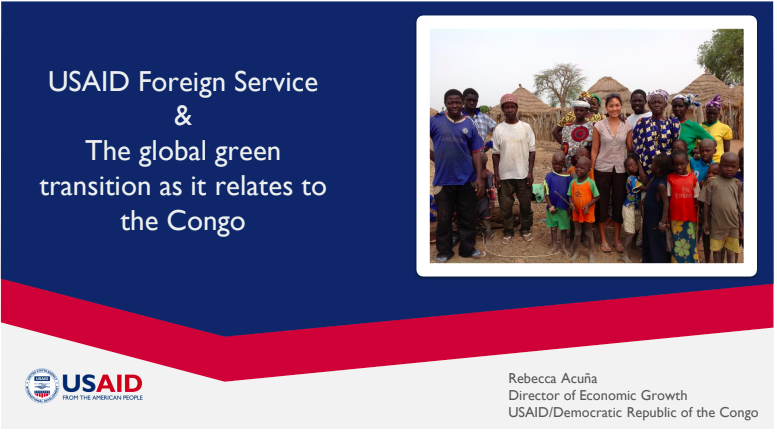April 05 2024 at 10:00PM
Event Recap | Careers in International Development and Sustainable Development in the Congo

Rebecca Acuña, as the Director of Economic Growth at the United States Agency for International Development (USAID) in the Democratic Republic of the Congo, significantly influenced my approach to project management across various industries. The United States Agency for International Development (USAID) promotes democratic values worldwide, spearheading international development and disaster assistance efforts, serving as the lead agency for implementing foreign policy with over 80 missions globally, and operating with a workforce of 1,200 Foreign Service Officers (FSOs) and numerous local staff. Rebecca's presentation on sustainable mining expanded my understanding beyond traditional project management boundaries, underscoring the importance of aligning economic goals with ethical and environmental considerations in all my projects. This broadened perspective deepened my appreciation for the wide-ranging impact of my work.
One key takeaway from Rebecca's presentation was the crucial role of stakeholder management. She emphasized that stakeholder engagement is foundational in project management. Engaging stakeholders such as communities, regulatory bodies, and interest groups is essential for achieving sustainable outcomes in any project. Establishing and nurturing trust and collaboration among these stakeholders is paramount, laying the groundwork for project success and fostering enduring relationships critical for sustained support and collaboration.
Rebecca shared the importance of recognizing and addressing the diverse needs and concerns of stakeholders as a critical aspect of effective stakeholder management. Actively attending to these differing perspectives allows project managers to effectively manage conflicts, navigate potential challenges, and gain valuable insights. This proactive approach not only facilitates smoother project execution but also enhances the overall quality of project outcomes. Additionally, fostering open communication and collaboration enables project managers to leverage the collective wisdom and resources of stakeholders, thereby amplifying the project's potential for success. Prioritizing stakeholder engagement and considering their diverse perspectives allows project managers to foster a sense of ownership and commitment among stakeholders, leading to increased buy-in and support for project goals and objectives.
Moreover, Rebecca highlighted the imperative of integrating environmental consciousness into project management practices, regardless of the project's industry. While not all projects may be directly linked to environmentally sensitive activities like mining, prioritizing environmental considerations ensures minimal ecological impact and contributes positively to conservation efforts. This strategic shift not only aligns with ethical standards but also enhances the project's reputation and legitimacy in the eyes of stakeholders and the broader community.
In conclusion, the profound dive into sustainable mining practices not only transformed my perspective as a project manager but also redefined my professional ethos. It broadened my horizons, enriched my understanding of responsible business practices, and infused my work with a sense of purpose. By embracing these principles, I am dedicated to catalyzing positive change across diverse projects and industries, shaping and elevating my career trajectory to new heights.
Please, reach out to us at sustainability@pmisfbac.org if you are interested in watching a recording of the Careers in International Development and Sustainable Development in the Congo presentation (1 PDU). You will be invoiced a regular registration fee.




